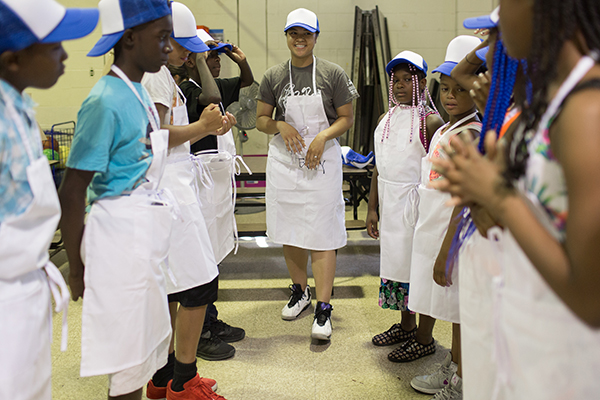Photo by Matt Stanley
Sharp Knives, Bright Minds
by Alex Jones
At Cooking Crew Academy, headquartered at Benjamin B. Comegys Elementary School in West Philadelphia, every meal the students serve begins with ceremonially trashing a traditional school lunch. Into the garbage goes the frozen pizza and french fries, and out from the kitchen comes food that could easily be on the menu of any farm-to-table restaurant in town: yellow squash and bulgur salad, collard green hummus and soba noodles with eggplant and mango, purple cabbage clementine slaw.
Twice a week during the school year and summer sessions, young chefs empowered by the academy’s cooking and nutrition training feed approximately 120 students and adults with fresh, plant-based meals made with ingredients that are often sourced from the neighborhood.
Elementary school student Shyheem Blagman has come back to Comegys over the summer for his third Cooking Crew Academy session, where students spend six weeks sharpening their knife skills, trying new ingredients and learning healthy recipes.
“I wanted to do Cooking Crew because I thought I had a future in cooking,” Blagman says, “and I wanted to show everyone.” At home, Blagman loves making omelets and other breakfast foods to serve to his mother and two brothers. “I want to be the owner of a restaurant [when I grow up],” he says.
Cooking Crew Academy (CCA) students learn alongside a nutrition educator, area high schoolers, college students and a group of Promise Corps members—an offshoot of the AmeriCorps program. The students also learn teamwork as they compete throughout the sessions as part of one of three teams to win the semester’s coveted prize, the Watermelon Cup, which is awarded based on points for presentation, flavor and cooperation. The Pineapple Prize goes to the student voted Most Valuable Chef; both trophies are made from fresh fruit.
Jarrett Stein designed and supports the Cooking Crew Academy program. He’s the director of Academically Based Community Service Partnerships and Student Engagement with the Agatston Urban Nutrition Initiative (UNI) at the University of Pennsylvania’s Netter Center for Community Partnerships; he also serves as volunteer executive director for Rebel Ventures, which sometimes shares mentors with CCA.
“We’ve always kept a core philosophy [that] kids want to be healthy. [Our job] is providing space, tools and support to allow this to happen,” says Stein. “[It’s amazing to see] third- and fourth-graders take control of the meal for all of their peers with very, very basic resources. This is the best of what we know how to do.”
Rebel Ventures started in 2010 at the now-shuttered Pepper Middle School, where students developed a tasty, healthy granola bar to sell to their fellow students. With organic, nutritious ingredients such as oats, dried fruit, and chia and pumpkin seeds, the Rebel Bar (originally called the Far Bar) was a hit: The student-run social enterprise that produces it and other products—Rebel Ventures—was born.
“We started with some core values, like youth power [and] listening to our customers in our community, and one product, which was the Rebel Bar, a healthy snack alternative to what was available,” says Stein. “With that one product, over the next three years, [we] built a youth development social enterprise model.”
Tiffany Nguyen co-founded Rebel Ventures as an eighth-grader at Pepper alongside other students, with Stein as their mentor. She’s been involved with the program in some way ever since.
“Just being with UNI [mentors] at Rebel Ventures, I learned how to run a business,” says Nguyen, who is now studying interior architecture at Marywood University. “It’s really busy, and you have to be really organized.” She continued to work with the program throughout high school and comes back to support Rebel Ventures and Cooking Crew Academy’s efforts during summers.
There are now six departments of Rebel Ventures, with students running every aspect from sales to accounting to research and development during after-school programs and summer sessions.
“The granola bars were really just a tool to develop the model,” says Stein. Now that the model is developed, the goals of the program will grow and change, too. “How can we use this model to really make a difference in the food landscape for our target customers, who are kids in schools?”
Allowing students room to make mistakes is key, says Stein.
“Rebel loves failing, because we learn from our mistakes and we really encourage experimentation and radical creativity,” Stein explains when Emily Irani, a UPenn senior who’s working with the crew as part of an internship program, tells him that this batch of Rebel Bars will be a little heavy on the pepitas: What could have been a wasted batch has turned into an experimental special edition.
“We like to work with what we have here,” Irani says. “I’ve learned a lot about the limited access that Philadelphia schools have to healthy foods and how big of a problem it actually is.”
To taste Rebel Ventures’ products outside of the public schools, pick up a Rebel Bar or a pack of Rebel Seeds at Mariposa Food Co-op or on the UPenn campus at 1920 Commons or Williams Café.









